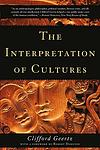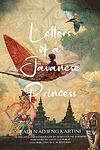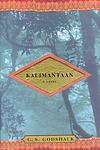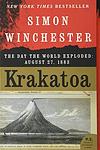The Greatest "Indonesia" Books of All Time
Click to learn how this list is calculated.
This list represents a comprehensive and trusted collection of the greatest books. Developed through a specialized algorithm, it brings together 284 'best of' book lists to form a definitive guide to the world's most acclaimed books. For those interested in how these books are chosen, additional details can be found on the rankings page.
Genres
Countries
Date Range
Reading Statistics
Click the button below to see how many of these books you've read!
Download
If you're interested in downloading this list as a CSV file for use in a spreadsheet application, you can easily do so by clicking the button below. Please note that to ensure a manageable file size and faster download, the CSV will include details for only the first 500 books.
Download-
1. Dreams from My Father by Barack Obama
This memoir explores the life of a man who grew up in a multicultural family, with a Kenyan father and an American mother. The narrative delves into his early years in Hawaii and Indonesia, his self-discovery and racial awakening in Chicago, and his journey to Kenya to learn more about his father's heritage. The book provides an introspective look at the author's struggle with his racial identity, his relationship with his family, and his path to finding his place in the world.
-
2. The Interpretation Of Cultures by Clifford Geertz
The book in question is a seminal work in the field of cultural anthropology, offering a collection of essays that introduce an interpretive approach to understanding cultures. The author argues for a deeper analysis of the symbols and meanings that constitute a society's fabric, suggesting that culture is a system of inherited conceptions expressed in symbolic forms. Through a series of case studies and theoretical discussions, the work emphasizes the importance of thick description—a detailed account of cultural practices—to grasp the context and nuances of social actions. The book challenges readers to consider the complexities of cultural interpretation and the anthropologist's role in deciphering the intricate webs of significance that define human life.
-
3. Letters Of A Javanese Princess by Raden Adjeng Kartini
The book is a poignant collection of letters written by a Javanese noblewoman at the turn of the 20th century, offering a rare glimpse into the life and thoughts of a woman caught between traditional Javanese culture and the encroaching influence of Western ideas. Through her correspondence, she passionately advocates for the education and emancipation of women in her society, expressing her own desires for intellectual growth and her frustrations with the limitations imposed by her status. Her letters reveal her deep reflections on colonialism, social justice, and the struggle for gender equality, providing a powerful voice for the women of her time and inspiring future generations in the fight for women's rights.
-
4. Into The Heart Of Borneo by Redmond O'Hanlon
The book is an enthralling travelogue that recounts the daring journey of two adventurers as they embark on an expedition into the dense rainforests of Borneo. With a blend of humor and erudition, the narrative captures their encounters with the island's unique wildlife, challenging terrain, and the indigenous Dayak people, whose customs and way of life are as intriguing as the natural wonders surrounding them. The travelers face numerous hardships and moments of awe, providing a vivid account of their quest to reach the center of one of the world's last great wildernesses.
-
5. The Painted Alphabet by Diana Darling
"The Painted Alphabet" is a magical realist novel that weaves together Balinese mythology with the tale of a contemporary woman's journey of self-discovery. Set against the backdrop of Bali's rich cultural tapestry, the story follows the protagonist as she encounters a series of mystical events and characters drawn from traditional Balinese folklore. Through her interactions with gods, demons, and ancestral spirits, she embarks on a transformative quest that challenges her perceptions of reality and identity, ultimately leading her to a deeper understanding of herself and the world around her. The novel is a celebration of the power of myth and the enduring relevance of ancient wisdom in modern life.
-
6. Eat, Pray, Love by Elizabeth Gilbert
The memoir chronicles a woman's journey of self-discovery and healing after a painful divorce. She spends a year traveling to three different countries, each representing a different aspect of her personal growth. In Italy, she indulges in pleasure and learns to appreciate life's simple joys. In India, she explores her spirituality and finds inner peace through meditation. In Indonesia, she seeks to balance the two extremes and ends up finding love again. Her experiences throughout the year help her regain her sense of self and happiness.
-
7. Kalimantaan by C. S. Godshalk
The novel is a historical fiction set in the 19th century, revolving around an English adventurer who establishes his own kingdom on the island of Borneo, known as Kalimantaan to its indigenous inhabitants. The story delves into the complexities of colonialism, exploring the adventurer's rule over the land and his interactions with the local tribes, European colonial powers, and his own family. As the narrative unfolds, it presents a tapestry of ambition, power, cultural conflict, and the impact of Western imperialism on both the conquerors and the conquered, painting a vivid picture of a bygone era marked by both brutality and beauty.
-
8. Poor Economics by Abhijit V. Banerjee, Esther Duflo
This book delves into the complex world of poverty, challenging conventional wisdom and assumptions about the economic decisions of the poor. Through rigorous analysis and empirical evidence, the authors explore how the poor make choices regarding education, health care, savings, and investments, revealing the logic behind these decisions. They argue that understanding these choices is crucial for designing effective anti-poverty policies. The book advocates for a more nuanced, bottom-up approach to economics, emphasizing the importance of specific, targeted interventions over broad, one-size-fits-all solutions. By combining detailed field research with economic theory, it provides insightful perspectives on how to empower the world's impoverished populations.
-
9. Krakatoa by Simon Winchester
The book provides a comprehensive account of the catastrophic eruption of the Krakatoa volcano in 1883, one of the deadliest volcanic events in recorded history. It explores the geological and historical context leading up to the eruption, detailing the scientific discoveries and cultural impacts that followed. The narrative delves into the global effects of the eruption, such as climatic changes and spectacular sunsets observed worldwide, and examines its profound influence on the local and global political landscapes. Through a blend of history, science, and vivid storytelling, the book captures the awe-inspiring power of nature and its lasting impact on human society.
-
10. Stranger in the Forest by Eric Hansen
This book is a gripping account of a man's 2000-mile trek across the dense forests of Borneo. The adventurer, who is also the author, recounts his journey on foot, which he undertook in the 1980s. He shares his encounters with the diverse wildlife, his experiences with the indigenous people, and the challenges he faced due to the harsh and unpredictable nature of the forest. His narrative also touches upon the detrimental effects of deforestation and the resulting loss of biodiversity.
-
11. Upheaval by Jared Diamond
This book delves into how nations cope with crises and the factors that determine their success or failure in overcoming them. By examining several countries' responses to profound upheavals, the author identifies a set of common challenges and solutions that can guide societies facing similar issues. Drawing parallels between personal psychological coping mechanisms and the ways countries navigate crises, the book offers a unique perspective on resilience, adaptation, and the critical choices that shape the destinies of nations. Through detailed case studies, it explores the complex interplay between national identity, societal flexibility, and the capacity for self-assessment, ultimately providing insights into the processes that enable societies to survive and thrive in the face of adversity.
-
12. Adventures Of A Young Naturalist by Sir David Attenborough
This book is a captivating memoir that chronicles the early expeditions of a renowned naturalist and broadcaster. It details his formative journeys through the wilds of Guyana, Indonesia, and Paraguay during the 1950s, where he collected specimens for the British Museum and filmed groundbreaking wildlife footage. The narrative is filled with the excitement of discovery, the beauty of untouched nature, and the sometimes humorous, sometimes perilous experiences of a young man deeply passionate about the natural world. His adventures lay the foundation for what would become an extraordinary career in educating and inspiring the public about the wonders of biology and the importance of conservation.
Reading Statistics
Click the button below to see how many of these books you've read!
Download
If you're interested in downloading this list as a CSV file for use in a spreadsheet application, you can easily do so by clicking the button below. Please note that to ensure a manageable file size and faster download, the CSV will include details for only the first 500 books.
Download










